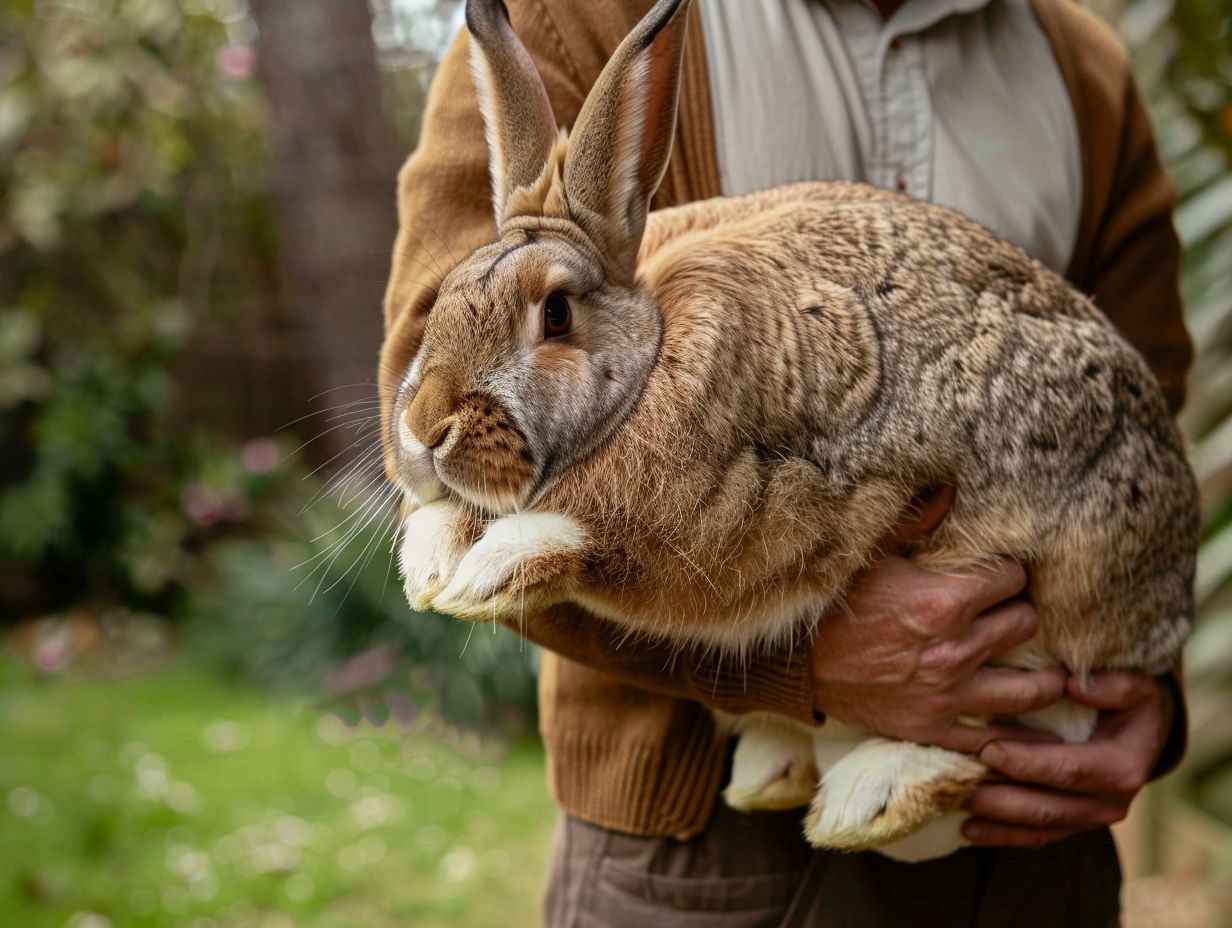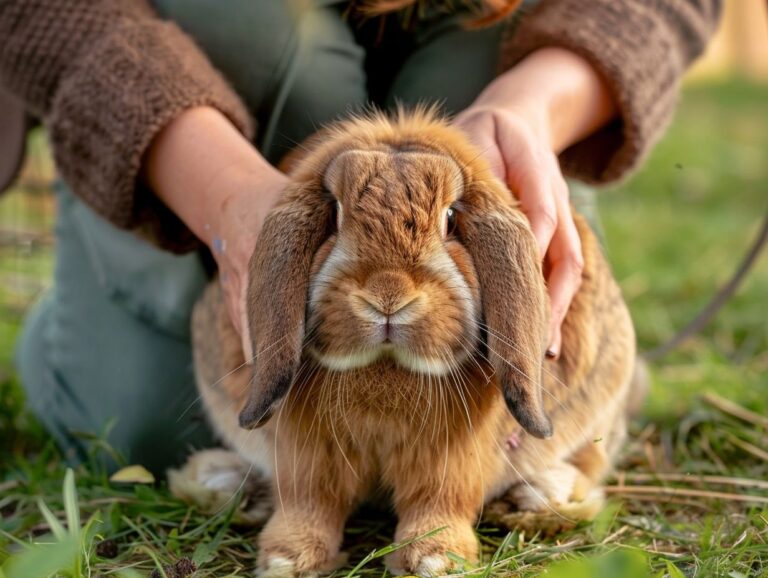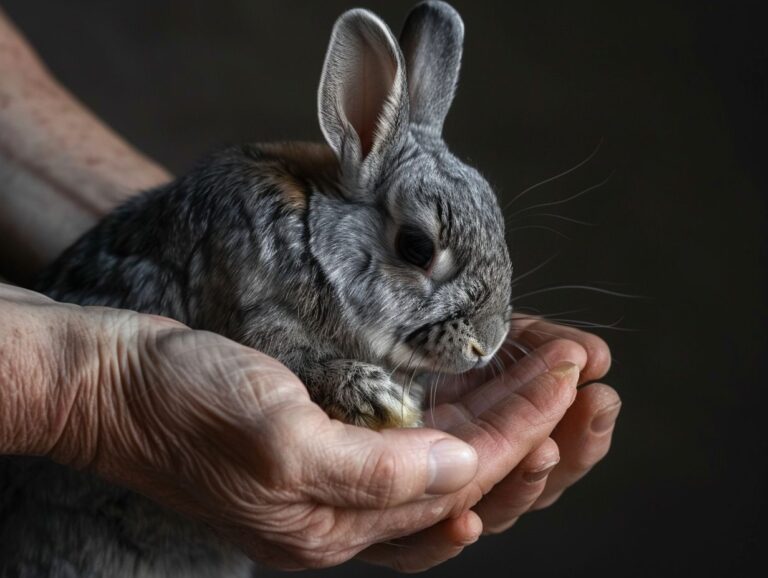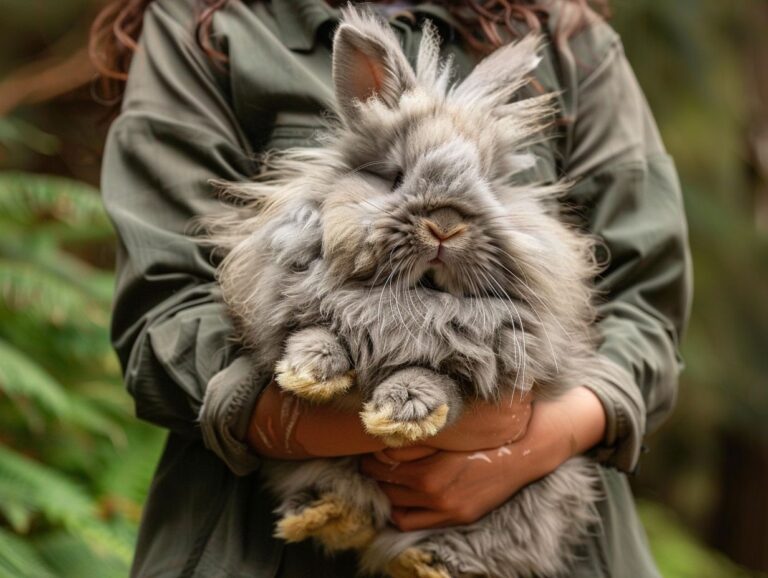American Rabbits As Pets: Care, Diet, and Health For Large Sized Breeds
Considering bringing a large-sized rabbit breed into your home as a pet?
We explore the most common large-sized rabbit breeds, their characteristics, basic needs, and how to care for them.
From housing requirements to dietary needs and grooming routines, we cover all aspects of caring for American rabbits as pets.
Discussing common health issues, spotting and treating them, and best practices for maintaining your rabbit’s health.
Join us as we delve into the world of large-sized rabbit breeds and learn how to provide the best care for these adorable companions.
Key Takeaways:
What Are Large Sized Rabbit Breeds?
Large-sized rabbit breeds are a popular category of domestic rabbits known for their impressive size, with notable varieties such as the Flemish Giant, Continental Giant, British Giant, and Checkered Giant. These breeds are recognized and documented by organizations like the American Rabbit Breeders Association.
These large breeds have unique characteristics that make them stand out among other rabbit breeds. For example, the Flemish Giant is known for its gentle nature and friendly disposition, while the Continental Giant is prized for its elongated body and striking appearance.
American Rabbit Breeders Association plays a crucial role in preserving breed standards and ensuring that these large rabbit breeds maintain their distinct traits. By providing guidelines on breeding, care, and exhibition, organizations like ARBA contribute to the preservation and promotion of these remarkable rabbit breeds.
What Are the Most Common Large Sized Rabbit Breeds?
Among the most common large-sized rabbit breeds are the Flemish Giant, Continental Giant, British Giant, and Checkered Giant. These breeds are known for their substantial size and unique characteristics, making them popular choices for rabbit enthusiasts worldwide.
The Flemish Giant is recognized for its impressive size, often weighing up to 15 pounds and measuring over 2 feet in length. Their signature feature is their thick, glossy fur that comes in various colors including black, blue, fawn, and white. They are gentle, docile rabbits that make great pets due to their friendly and social nature.
The Continental Giant is another giant breed, originating from Belgium. These rabbits can reach weights of up to 25 pounds and have a wide range of coat colors such as agouti, black, and steel. Known for their calm temperament, Continental Giants are ideal for families looking for a laid-back small breed rabbit companion.
The British Giant is a substantial breed with a sturdy frame and can weigh around 12-15 pounds. Their coat colors include black, blue, and steel. Despite their size, Belgian Hare rabbits are known for their docile and friendly nature, making them a preferred choice for both novice and experienced rabbit owners.
The Checkered Giant is easily recognizable by its striking white coat with bold black markings giving them a checkered appearance. They are medium to large-sized rabbits with an alert and energetic temperament. Checkered Giants are playful and inquisitive, requiring ample space to roam and explore, making them suitable for active households.
What Are the Characteristics of Large Sized Rabbit Breeds?
Large-sized rabbit breeds exhibit unique characteristics that set them apart from smaller breeds. Their substantial size requires adequate space for housing and exercise, and they often have gentle personalities that make them ideal as pets for individuals seeking a larger companion animal.
One of the standout features of large rabbit breeds is their docile nature, which makes them excellent pets for families with children or individuals looking for a calm and affectionate animal companion. Despite their size, these rabbits are often friendly and enjoy human interaction.
Providing a suitable living environment for these breeds is crucial to ensure their well-being and happiness. This includes a spacious hutch or enclosure that allows them to move around freely and engage in hopping and playing, which are essential for their physical and mental health.
What Are the Basic Needs of American Rabbits as Pets?
When caring for American rabbits as pets, it is essential to address their basic needs, including suitable housing, a balanced diet, regular health checks, and appropriate handling. Understanding the specific requirements of pet rabbits can contribute to their overall well-being and longevity.
American rabbits, like any other pet, benefit greatly from a secure and spacious habitat that allows them to move around comfortably. A well-ventilated enclosure with a sheltered area for resting is ideal for their physical and mental health. Diet plays a crucial role in their well-being, consisting mainly of hay, fresh vegetables, and occasional fruits. Regular veterinary check-ups are essential to monitor their health and prevent any potential illnesses.
What Type of Housing Do Large Sized Rabbit Breeds Need?

Large-sized rabbit breeds require spacious and comfortable housing that accommodates their size and activity levels. Indoor setups with suitable bedding and outdoor enclosures with adequate protection are recommended, with wire-bottomed cages to be avoided due to potential health issues.
Space is essential for these small breed rabbits as pets to move around comfortably and exhibit natural behaviors, such as running, jumping, and exploring. Ensuring safety is crucial, as they can be prone to injuries, particularly if they feel cramped or restricted.
Proper bedding plays a significant role in maintaining their hygiene and comfort, with options like straw, hay, or rabbit-safe recycled paper bedding being ideal choices.
What Should Be Included in Their Diet?
The diet of large-sized rabbit breeds should consist of a balanced mix of hay, fresh vegetables, and high-quality pellets to ensure they receive essential nutrients for their health and well-being. Proper nutrition plays a crucial role in maintaining their overall health and preventing diet-related issues.
Hay is a staple in the diet of large rabbits, providing essential fiber for their digestive health.
- Fresh vegetables such as leafy greens, carrots, and bell peppers offer vitamins and minerals crucial for their growth and immunity.
- Alongside vegetables, high-quality pellets formulated for rabbits are essential as they provide a concentrated source of nutrients.
It’s important to monitor the rabbit’s diet to prevent obesity and dental issues.
Rabbits also require access to fresh water at all times to support their digestion and overall well-being.
How Often Should They Be Groomed?
Regular grooming is essential for large-sized rabbit breeds to prevent health issues such as Pododermatitis, Arthritis, and Flystrike. Maintaining good hygiene through consistent grooming practices can contribute to their overall well-being and reduce the risk of common skin and coat problems.
Grooming large rabbit breeds involves regular brushing to remove loose fur, prevent matting, and distribute natural oils for healthy skin and coat maintenance. Nail trimming is crucial to prevent overgrowth, which can lead to discomfort and difficulty moving. Coat care includes checking for parasites like mites and ensuring proper ventilation to prevent Flystrike. Proper grooming not only keeps them looking their best but also helps owners bond with their pets and monitor their health closely.
How to Care for American Rabbits as Pets?
Caring for American rabbits as pets involves a holistic approach that addresses their physical and emotional well-being. Understanding their unique personalities, providing proper care, bonding through interaction, ensuring regular exercise, and scheduling veterinary check-ups are essential components of responsible rabbit ownership. The provided text is already well-formatted with appropriate HTML tags. No further formatting is needed.
What Are the Most Important Aspects of Daily Care?
Daily care for American rabbits includes monitoring their health, ensuring they have access to fresh water and a balanced diet, and observing their behavior for signs of potential issues such as GI Stasis or problems with their food bag. Regular care and attention are crucial for maintaining the well-being of pet rabbits.
Proper health monitoring involves keeping a close eye on your rabbit’s weight, fur condition, and overall demeanor. Any signs of lethargy, changes in appetite, or abnormal stool should be promptly addressed. Fresh hay should be available at all times to support their dental health and digestive system. Incorporating a variety of fresh vegetables such as leafy greens and carrots into their diet can provide essential nutrients and prevent issues like obesity. Observing their pen for any signs of abnormal fecal pellets or uneaten food can indicate potential health concerns.
How to Bond with Your Large Sized Rabbit Breed?

One effective way to enhance bonding with your large-sized rabbit is through regular handling sessions. Take the time to touch and stroke your rabbit gently, avoiding sudden movements that may startle them. This helps them get accustomed to your touch and builds their confidence in your presence. Incorporating enrichment activities into their daily routine can provide mental stimulation and prevent boredom. Activities like puzzle feeders, tunnels, and interactive toys can keep them engaged and happy.
Common Health Issues and How to Prevent Them
Understanding common health issues in large-sized rabbit breeds is essential for proactive care and prevention strategies. Conditions like Pododermatitis, Arthritis, Cardiomyopathy, and Flystrike can impact their well-being, but with proper preventive measures and early detection, many health issues can be mitigated or avoided altogether. “
Rabbits, especially large breeds, are prone to obesity, which can lead to various health complications.
- Dietary management plays a crucial role in maintaining an ideal weight for rabbits, ensuring they receive a balanced diet with proper hay, fresh vegetables, and controlled pellets.
- Regular exercise is vital to prevent obesity and joint problems in larger rabbit breeds.
- Regular health check-ups by a specialized veterinarian help in early detection of potential health issues.
- Engaging the rabbits in enriching activities like tunnels, toys, and playing outdoors can improve their mental and physical well-being.
What Are the Most Common Health Issues for Large Sized Rabbit Breeds?
Large-sized rabbit breeds are prone to specific health issues such as Cardiomyopathy, Flystrike, and Arthritis, which can impact their quality of life and longevity. Recognizing the signs of these conditions and taking preventive measures are crucial for maintaining the health and well-being of pet rabbits.
Cardiomyopathy, a heart condition that can affect rabbits, may present with symptoms like lethargy, difficulty breathing, or fainting. Obesity, genetic predisposition, and poor diet are common risk factors for this illness.
Flystrike, a condition caused by flies laying eggs on a rabbit’s fur, can lead to painful infections. Ensure good hygiene, especially in warm weather, to prevent this issue. For more information on Rhinelander rabbits as pets, care, diet, and health for medium-sized breeds.
Arthritis, common in older rabbits, manifests as stiffness, limping, or reluctance to move. Providing appropriate bedding and exercise can help manage arthritis in large rabbit breeds.
How to Spot and Treat These Health Issues?
Early detection and prompt treatment are vital in managing health issues in large-sized rabbit breeds. Monitoring their behavior, appetite, and physical condition can help in spotting potential problems, and consulting a veterinarian for accurate diagnosis and tailored treatment plans is essential for addressing health issues effectively.
Recognizing common health problems early in large-sized rabbits is crucial to ensure their well-being. Owners should be vigilant for signs such as sudden weight loss, changes in fecal output, and irregular grooming habits.
- Gastrointestinal issues: Watch for symptoms like bloating, diarrhea, or reduced activity levels, as these could indicate gastrointestinal problems.
- Dental problems: Ensure their teeth are not overgrown and provide adequate chew toys to prevent dental issues.
Regular check-ups with a rabbit-savvy veterinarian are important to catch health concerns early and provide appropriate care.
What Are the Best Practices for Maintaining Your Rabbit’s Health?
Maintaining the health and well-being of large-sized rabbit breeds involves adopting best practices that focus on preventive care, regular veterinary check-ups, proper nutrition, and a conducive living environment. These proactive steps can contribute to extending their lifespan and ensuring a higher quality of life for pet rabbits.
One of the key aspects to keep in mind when caring for large rabbits is to provide high-quality hay as the main component of their diet. Hay helps maintain proper digestion and dental health, crucial for these breeds. Incorporating a variety of fresh vegetables, such as leafy greens and carrots, can offer essential nutrients. It’s important to monitor their weight to prevent obesity, which can lead to health issues.
Regular exercise is vital for large rabbits to prevent obesity and keep their muscles toned. Providing a spacious and safe environment for them to roam and explore can help fulfill their exercise needs. Ensuring they have access to toys and tunnels can also stimulate their physical and mental well-being. Regarding their living space, maintaining optimal temperature and humidity levels is important to prevent respiratory issues. Regularly cleaning their living quarters and providing fresh bedding are key to preventing infections and stress.
Frequently Asked Questions
What are some large sized rabbit breeds that make good pets?
There are several large sized rabbit breeds that make great pets, such as the Flemish Giant, the Checkered Giant, and the Giant Chinchilla.
What type of housing is best for American rabbits?
American rabbits, especially larger breeds, need plenty of space to hop and play. A large, multi-level hutch or a spacious indoor pen are both good options for their housing.
How much exercise do large sized rabbits need?
Large sized rabbits are active animals and need at least 2-3 hours of exercise every day. This can include supervised playtime outside of their enclosure or a large play area within their enclosure.
What should I feed my American rabbit?
American rabbits should have a balanced diet that consists of mostly hay, a small amount of fresh vegetables, and a limited amount of pellets. Consult with a veterinarian for specific dietary recommendations based on your rabbit’s breed and age.
What are some common health concerns for large sized rabbits?
Large sized rabbits are prone to developing arthritis due to their size and weight. They are also susceptible to dental issues, such as overgrown teeth, and gastrointestinal problems. Regular check-ups with a rabbit-savvy veterinarian can help prevent and treat these issues.
Are American rabbits good pets for children?
American rabbits, especially larger breeds, can make great pets for older children who are able to handle them gently and responsibly. However, they may not be suitable for younger children as they require a lot of care and supervision. It is important to teach children how to properly handle and care for rabbits before bringing one into the family.





